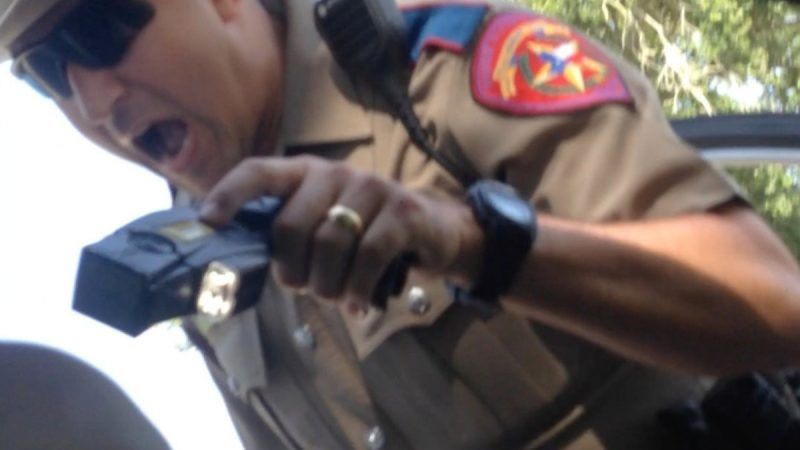Cellphone Video Provides Further Evidence That the Cop Who Arrested Sandra Bland Was Angry Rather Than Afraid
Trooper Brian Encinia could see that Bland, whom he stopped for failing to signal a lane change, was holding a cellphone, not a weapon.

Brian Encinia, the Texas state trooper who arrested Sandra Bland in 2015 after pulling her over for failing to signal a lane change, claimed he feared for his safety when Bland, who died of an apparent suicide three days later in the Waller County jail, resisted his orders to put out her cigarette and get out of her car. Newly released cellphone video of the encounter casts further doubt on that already implausible claim.
The widely viewed dashcam video of the traffic stop, which the Texas Department of Public Safety (DPS) released after Bland's death, suggests that Encinia lost his temper and needlessly escalated the situation because she was not sufficiently obeisant. The 39-second cellphone video, which Bland's relatives and their lawyers say they had never seen before, reinforces that impression.
"Get out of the car, now!" Encinia commands at the beginning of the video. Bland objects that he is "threatening to drag me out of my own car" over a minor traffic violation, at which point Encinia draws his Taser and bellows, "Get out of the car! I will light you up! Get out! Get out of the car!"
Bland complies, while continuing to complain about Encinia's excessive and unnecessary use of force. He orders her to "get off the phone," and she replies, "I'm not on the phone. I have a right to record. This is my property." Encinia disagrees. "Put your phone down, right now!" he shouts. The dashcam video shows Bland putting her phone down on the trunk of her car, at which point the cellphone video ends.
In the dashcam video, Bland continues to complain about Encinia's treatment of her, demanding to know why she is being arrested. He handcuffs her and, according to a lawsuit filed by Bland's family, tackles her, knocks her head against the pavement, and kneels on her back. Although those actions cannot be seen in the dashcam video, Bland can be heard complaining about them.
Encinia later told DPS he was afraid of Bland. "My safety was in jeopardy at more than one time," he said, suggesting that Bland could have grabbed a weapon from her purse or from somewhere else in the car. But it's clear now that Bland was holding her cellphone and using it to record Encinia while she was still inside the car. Furthermore, he saw that she was holding a cellphone and not a weapon.
"What the video shows is that Encinia had no reason to be in fear of his safety," Cannon Lambert, an attorney representing Bland's family, told The New York Times. "You could see that it was a cellphone, he was looking right at it….So if the video showed that he had no basis of being in fear of his safety, and he lied about that, then you would think [prosecutors] would be using that video."
DPS fired Encinia in 2015 after concluding that he had "violated the department's procedures regarding traffic stops and the department's courtesy policy." In 2016 a grand jury indicted him for perjury, concluding that he had lied in his report on the arrest when he claimed that "I had Bland exit the vehicle to further conduct a safe traffic investigation." Prosecutors dropped the perjury charge in exchange for Encinia's promise not to work in law enforcement ever again.
A 2017 law that Texas legislators passed in response to Bland's death, which became a leading exhibit for the Black Lives Matter movement, requires that police be trained to "de-escalate interactions with the public," encourages treatment for arrestees with mental health issues, and mandates independent investigations of deaths in jail. The Sandra Bland Act also requires reporting on traffic stops by state and local law enforcement agencies, and recent data indicate that around 45,000 Texas drivers are arrested each year for minor traffic violations. A bill introduced this year by state Rep. James White (D-Austin) would prohibit arrests for legal violations that are not punishable by jail sentences.
Show Comments (44)